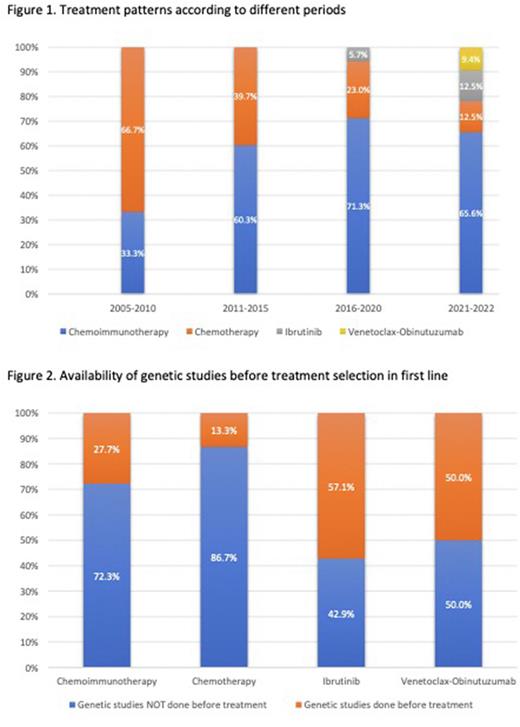Abstract
Introduction: Chronic Lymphocytic Leukemia (CLL), the most frequent leukemia in adult patients in Western countries, has an incidence that varies according to the geographical region. LATAM is a very heterogeneous region regarding ethnicity and access to care. This translates into differences in the availability of diagnostic and prognostic tools as well as therapeutic options for patients throughout the continent. In the last years, the treatment of CLL has shifted toward the use of targeted agents in first- and second-line therapy. The differences in the access to such agents results in inequality when it comes to offer treatment options. In this observational, retrospective, international study we aim to describe the epidemiological data of patients with CLL in Latin America, the access to and use of biomarkers and treatment patterns.
Methods: Patients with 18 years or older, diagnosed with or treated for CLL between 2005-2022 in centers participating in the GELL were included. Patients treated in clinical trials were excluded.
Results: 470 patients were analyzed from 6 countries (Peru, Mexico, Paraguay, Chile, Venezuela and Uruguay). 78% were treated at private institutions. The median age was 69 years (35-97), and 193 (41%) were women. According to race, 416 (89%) were white, 2 (0.4%) were black, 2 (0.4%) were indigenous, and 50 (11%) were of mixed race. 337 (72%) had ECOG 0-1. Stage distribution was Rai 0: 183 (39%), I: 120 (26%), II: 61 (13%), III: 34 (7%), IV 26 (6%), and unclassified 46 (9%). Regarding prognostic factors: 11% were CD38 positive. B2-microglobulin data were available in 233 patients (49.5%) and in 124 was high (53%), IgVH mutational status in 41 (9%) of whom 27 (6%) were mutated and 14 (3%) were unmutated. 355 (76%) of patients were observed at time of diagnosis. 220 (47%) patient required treatment with median time to first line treatment of 6 months (range 0-204). Among patients who received treatment, 50 (23%) had cytogenetic and 57 (26%) FISH studies performed. Del17p was detected in 5 patients. P53 mutational status was studied in 12 patients, 1 was found mutated. First line treatment was as follows: Chemotherapy: (Chlorambucil +/- prednisone 46 patients, FC 15, CHOP-like 8), Chemoimmunotherapy (FCR 56, R-CHOP-like 40, BR 24, Chlorambucil + AntiCD20 MoAb 17, FR 1), Ibrutinib 9, Venetoclax + Obinutuzumab 3. Treatment strategies according to date of treatment is shown in Figure 1. 146 (78%) of patients who received chemotherapy or chemoimmunotherapy did not have a previous cytogenetic analysis (Figure 2). According to the country, Uruguay 37%, Mexico 74%, Chile 82%, Peru 83%, Paraguay 89% and Venezuela 96% did not have genetic studies before therapy.
Conclusions: Our study shows real-world data in CLL patients from LATAM. The median age at diagnosis is comparable to those reported in developed countries moreover, we report a high percentage of patients with early-stage disease at diagnosis related to the higher diagnosis of asymptomatic patients in routine exams.Most patients treated with chemotherapy or chemoimmunotherapy did not have a cytogenetic testing to guide treatment selection. Also, there are differences in access to cytogenetic testing between the countries analyzed. We show a slight change in treatment patterns in the last years, chemoimmunotherapy remains the most used first line treatment, and a suboptimal access to novel agents is evident. We plan to expand our study cohort with data from the other LATAM countries to have a deeper understanding of the reality of our region and help overcome inequalities.
Disclosures
Oliver:Abbvie: Membership on an entity's Board of Directors or advisory committees, Speakers Bureau; Agencia Nacional De Investigacion e innovacion: Research Funding; Janssen: Speakers Bureau; Nolver: Membership on an entity's Board of Directors or advisory committees; Roche: Speakers Bureau. Villela Martinez:Roche Mexico: Speakers Bureau; AstraZeneca Mexico: Speakers Bureau; Janssen Mexico: Speakers Bureau; Sanofi Mexico: Speakers Bureau; Asofarma Mexico: Speakers Bureau. Alvarez:Novartis,: Speakers Bureau; AbbVie: Speakers Bureau; Bristol: Speakers Bureau; Janssen: Speakers Bureau; Takeda: Speakers Bureau; Teva: Speakers Bureau. Castillo:Cellectar: Consultancy; AstraZeneca: Research Funding; Beigene: Consultancy, Research Funding; Abbvie: Consultancy, Research Funding; Janssen: Consultancy; Roche: Consultancy; TG Therapeutics: Research Funding; Pharmacyclics: Consultancy, Research Funding.
Author notes
Asterisk with author names denotes non-ASH members.


This feature is available to Subscribers Only
Sign In or Create an Account Close Modal